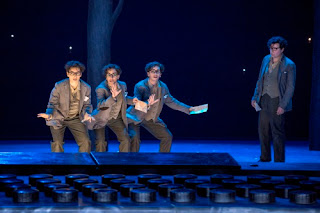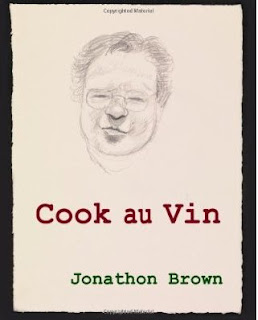...facilis descensus Averno;
noctes atque dies patet atri ianua Ditis;
sed revocare gradum superasque evadere ad auras,
hoc opus, hic labor est.
noctes atque dies patet atri ianua Ditis;
sed revocare gradum superasque evadere ad auras,
hoc opus, hic labor est.
The gates of hell are open night and day;
Smooth the descent, and easy is the way:
But to return, and view the cheerful skies,
In this the task and mighty labour lies.
Smooth the descent, and easy is the way:
But to return, and view the cheerful skies,
In this the task and mighty labour lies.
Virgil Aeneid Book 6 lines
126-9, English translation by Dryden
Even so, full wellness didn't return until November.
The mechanisms and triggers of these devastating episodes I still fail to understand. Did the trauma of extended dental work including a three-hour tooth extraction kick it all off, as I felt it had when the first crisis began six or so years ago? Was it the full impact deferred to the middle years of a bereavement in adolescence - the death of my father when I was 15? Well, in psychotherapy we've been through all that, raised aspects I hadn't considered - how not a single person really asked how I was, since all focus was on looking after mother; how maybe these spells from the mid-forties onwards have been a kind of identification with my unhappy father, disabled for the five years between his first stroke and his second, sitting at home feeling useless. Now I don't think we'll get any further along that line, though who knows?
Still I don't feel equal to defining the abyss. I need others to do it for me. Gwyneth Lewis in Sunbathing in the Rain, 'a cheerful book about depression', approaches it poetically; Lewis Wolpert's Malignant Sadness and Andrew Solomon in The Noonday Demon add to the stock of understanding. With the qualification that all-enfolding love never deserted me - and I would insist that my best of men saved me, as before - Solomon's opening definition of depression does the job:
It is the aloneness within us made manifest, and it destroys not only connections to others but also the ability to be peacefully alone with oneself. Love, though it is no prophylactic against depression, is what cushions the mind and protects it from itself. Medications and psychotherapy can renew that protection, making it easier to love and be loved, and that is why they work...In depression, the meaninglessness of every enterprise and every emotion, the meaningless of life itself, becomes self-evident. The only feeling left in this loveless state is insignificance.
All I know is that on examination of the terrible times, there were oases of love and reassurance, even enjoyment, however much a casual glance back suggests nothing but the black. All this may seem strange since this is mostly a blog about enthusiasms, and, yes, I do love life with a passion when I'm well. Everything in the alternative state is a negative of that, a reversal. Two borrowed ways of defining it have been to say that I lost my soul, and that I joined the ranks of the undead (since at its most seemingly unendurable it did indeed feel like a fate worse than death, which you think about so often in the negative state; I don't believe anyone who denies this). Is there more than a touch of the bipolar? Very possibly. Each doctor, psychiatrist and psychotherapist seems to have different theories. It's not a science, but to be sure it needs medical supervision. If simply mentioning all this helps someone out there, then it's been worthwhile: don't be afraid to ask if you think I can be of use, though I don't suppose I can say more than, endure, this too will pass.
Anyway, here I am back in the midst of abundance, and in the few months of full enjoyment I can easily pick out a list of highlights. There were a few earlier in the year - chiefly an isolated excursion to English National Opera to see my beloved Rosenkavalier, and though there was a veil or two between me and my usual enjoyment of it, I could tell that this was a superlative revival, vivaciously conducted by Edward Gardner with perhaps the most successful third act I've seen. Sarah Connolly trumped her first Octavian at ENO, Amanda Roocroft had the bittersweet presence the Marschallin needed and John Tomlinson's chief asset as a vintage Ochs was his sheer ease on stage. But the voice which blew us away was Sophie Bevan's, blooming every time her Sophie hit a high ecstatic line. Here she is with Connolly in the Presentation of the Rose (photo for ENO by Clive Barda).
Richard Jones's staging of Martinů's Julietta was the next operatic highlight, drawing very few negative criticisms from anybody other than about the quality of the music and its subject, in which I was happy to join battle on the rapturously positive side. Below, three mini-Michels and the 'real' he (fabulous Peter Hoare) photographed for ENO by Richard Hubert Smith.
I seem to have struck very rare Royal Opera gold in July to catch Anja Harteros's long overdue return to the house. Her Desdemona shone Venus-starlike in a Verdi Otello which also included the right-sounding sort of protagonist in Alexanders Antonenko and magnificent work, as ever in the Italian rep, from Pappano and the Royal Opera Orchestra; shame about the Iago and the lame old production.
It was hard work getting to Glyndebourne for The Cunning Little Vixen, especially as that opera's glorious message wasn't chiming with me at the time, but I reckon Melly Still did a good job on the production. A much happier experience later in the year was talking again at a study day on The Marriage of Figaro while the Glyndebourne tour was kicking off at its home base, and loving the mostly superlative cast of the subsequent performance as well as Jonathan Cohen's vivacious conducting.
December brought my only Wagner live other than the surprisingly satisfying experience of hearing Mark Wigglesworth scale mountains in De Vlieger's potted Ring for orchestra. If any operatic event in anniversary year is better than the Fliegende Holländer in question, I'll feel lucky: Bryn Terfel covering all expressive and dramatic bases as an astounding Dutchman was equalled by Anja Kampe and Matti Salminen in the visiting Zurich Opera concert performance.
Mezzo of the year second time running for me is sublime Alice Coote (pictured above by Ben Ealovega), for her Mahler Rückert Songs with Saraste and the BBC Symphony Orchestra, and her Purcell, Handel and Britten Phaedra alongside the splendid Britten Sinfonia. Violinist Catherine Martin (pictured below) revealed afresh the strange beauties of Biber's 'Rosary' Sonatas between homages to Bach's Orgelbüchlein in the Tower.
The BBCSO pulled off a sequence of well-programmed concerts but the LPO carries on reaping the rewards of a central intelligence in the shape of their music director Vladimir Jurowski. Hard to choose from his through-planned events, which will continue in 2013, but the last of his programmes I heard this year still resonates, with a spellbinding revelation of Grisey's Quatre chants pour franchir le seuil (Four chants for crossing the threshold) enveloping hyper-agile soprano Allison Bell in a host of original sonorities. The Mahler Five that followed was absolutely fresh, too, as one has come to expect from VJ.
Theatre - I saw too little, though the Young Vic Three Sisters came to seem like a masterpiece of rethinking alongside the music-drenched pantomime of the Vakhtangov Company's enervatingly wilful Uncle Vanya (wish I'd seen Lucy Bailey's Print Room Vanya). So glad, all the same, to have been along to five of the Globe to Globe shows, top of the list the Maori Troilus and Cressida and the Hindi musical version of Twelfth Night (photo below by Simon Annand).
And we did a bit of catching up the week before Christmas with the still-sparkling second cast One Man, Two Guv'nors and a Sondheim treat which has been top of many critics' lists, Merrily We Roll Along at the wonderful Menier Chocolate Factory.
Now I feel more like the youthful Frank and Charley (Mark Umbers and Damian Humbley pictured by Tristram Kenton above), starting out at the end of the show with wide-eyed optimism. Here's to a much better 2013 - and may yours be what you wish of it.
.jpg)













._1890.JPG)

+in+One+Man,+Two+Guvnors+at+the+Theatre+Royal+Haymarket.+Photo+credit+Johan+Persson.jpg)

.-photo-by-johan-persson.jpg(1).jpg)
+Tristram+Kenton.jpg)
+COOPER.jpg)
+COOPER.jpg)
+COOPER.jpg)
+COOPER.jpg)
+Tristram+Kenton.jpg)
+Tristram+Kenton.jpg)

+COOPER.jpg)


















.jpg)









